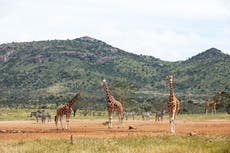Giraffes are as socially complex as elephants, study finds
Females have more power and status than males in African species’ societies

Your support helps us to tell the story
From reproductive rights to climate change to Big Tech, The Independent is on the ground when the story is developing. Whether it's investigating the financials of Elon Musk's pro-Trump PAC or producing our latest documentary, 'The A Word', which shines a light on the American women fighting for reproductive rights, we know how important it is to parse out the facts from the messaging.
At such a critical moment in US history, we need reporters on the ground. Your donation allows us to keep sending journalists to speak to both sides of the story.
The Independent is trusted by Americans across the entire political spectrum. And unlike many other quality news outlets, we choose not to lock Americans out of our reporting and analysis with paywalls. We believe quality journalism should be available to everyone, paid for by those who can afford it.
Your support makes all the difference.Giraffes are as socially complex as elephants, and their collective organisation is far more advanced than was previously understood, a new study has revealed.
Researchers from the University of Bristol who examined interactions in the African species found that they stay alive long after being able to reproduce so that they can help care for the young in their wider family circles, such as nieces, nephews and grandchildren.
Previously it was thought giraffes had weak relationships and fewer bonds with their own type. But in the past 10 years, it was found that living close to human settlements disturbs their social networks.
The scientists found that giraffes can spend a third of their lives “post-menopause”, which is comparable to other species with highly complex social structures.
Elephants, for example, spend just under a quarter of their lives (23 per cent) of their lives in a post-reproductive state.
The reason may be the “grandmother hypothesis”, which says that human females and other mammals survive well past their reproductive prime because of the benefits post-menopausal women offer to their grandchildren.
The research, published in the journal Mammal Review, also discovered the animals’ social structures are matrilineal – meaning females are dominant and have more power and status than males.
Zoe Muller, of Bristol’s School of Biological Sciences, said: “It is baffling to me that such a large, iconic and charismatic African species has been understudied for so long.
“This paper collates all the evidence to suggest that giraffes are actually a highly complex social species, with intricate and high-functioning social systems, potentially comparable to elephants, cetaceans and chimpanzees.
“I hope that this study draws a line in the sand, from which point forwards giraffes will be regarded as intelligent, group-living mammals that have evolved highly successful and complex societies, which have facilitated their survival in tough, predator-filled ecosystems.”
Ms Muller has suggested future research into the role that older, post-reproductive adults play in society and what benefits they bring for group survival.
She added: “Recognising that giraffes have a complex cooperative social system and live in matrilineal societies will further our understanding of their behavioural ecology and conservation needs.
“Conservation measures will be more successful if we have an accurate understanding of the species’ behavioural ecology.
“If we view giraffes as a highly socially complex species, this also raises their ‘status’ towards being a more complex and intelligent mammal that is increasingly worthy of protection.”
Additional reporting by SWNS


Join our commenting forum
Join thought-provoking conversations, follow other Independent readers and see their replies
Comments